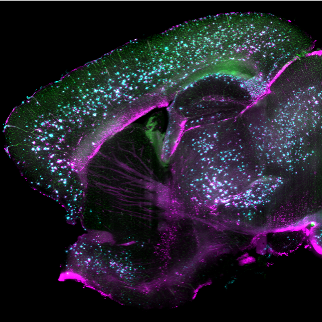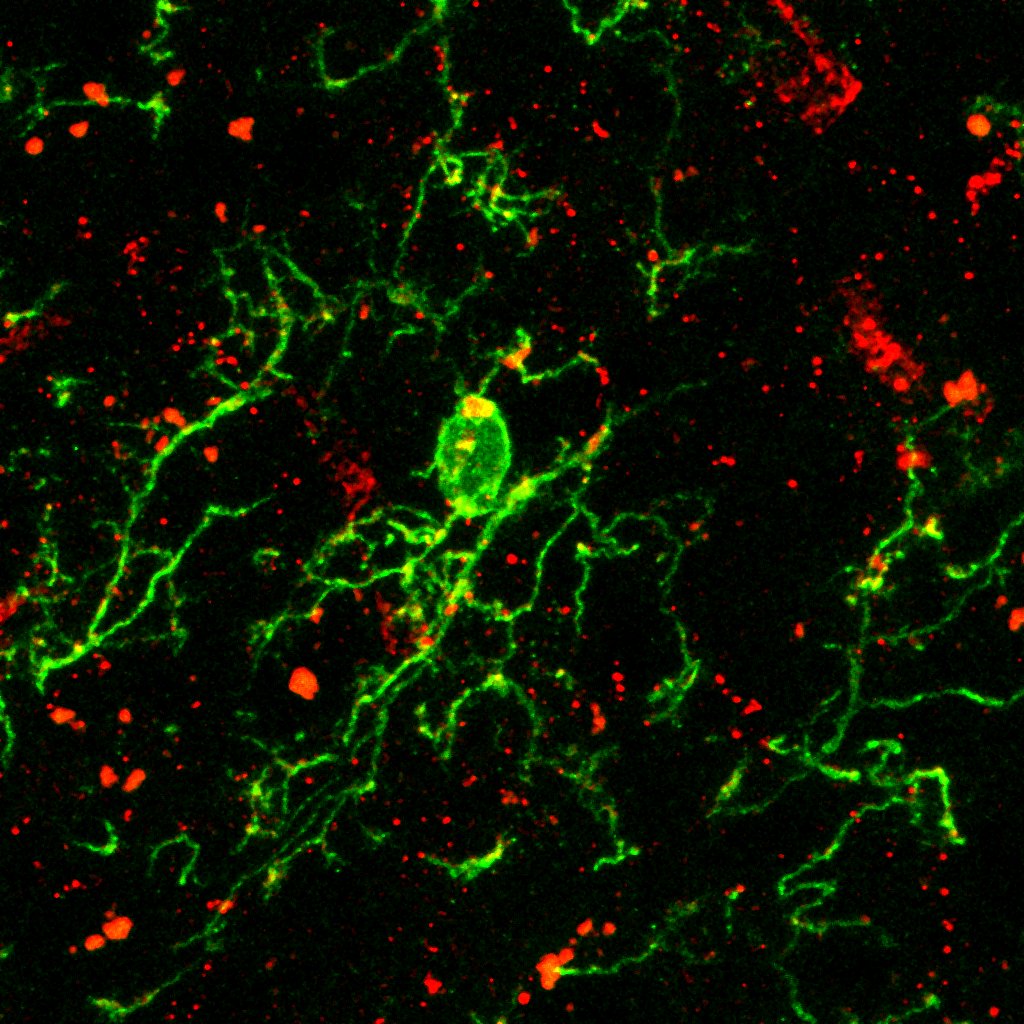

- wenqiang.chen@joslin.harvard.edu
- wenqiang.chen.01@regionh.dk
Vision for My Future Lab
Here I will introduce what I have envisioned for my future independent lab
Statements on my thoughts of my future lab:
- disease-orienting
- brain-centeredWenqiang Chen, Ph.D.
(1) Disease-orienting nature
Key words: mood disorders, cocaine addition, AD
Previous / Recent Research
From the very beginning of my research career, everything I am doing is about disease:
- Undergraduate: brain ischemic injury (using a rat MCAO model)
- M.Sc. degree: depression and anxiety (established chlorpyrifos-induced rat model of mood disorders)
- Ph.D. degree: cognitive impairment (spatial nagivation in postnatal rats)
- Postdoc #1: cocaine addiction (IVSA model), schizophrenia (Setd1a mutant mice)
- Postdoc #2: insulin resistance, disease associated cells (astrocyte, microglia), AD
- Steno visit: T2D/AD (patient CSF/plasma).
A confocal image showing microglial phagocytosis in AD mouse model (3xTg, 3-month-old). Image acquired with my students at the Bordeaux School of Neuroscience, 07/2024, Bordeaux, France. Note, green, IBA1; red, amyloid-beta.
Current / Future Research
The previous / recent research has shaped my vision for my future labs, where I am thrilled to be investigating the following questions/areas:
- Disease Comorbidity: why certain brain diseases have high risk of developing other paghological conditions or disorders?
- Biomarkers: are there fluid biomarkers that can predict disease progression or conversion to an advanced stage (AD)?
- Functional role: what are the physiological or pathophysiological roles of these identified biomarkers?
(2) Centered on the brain
Key words: mood disorders, cocaine addition, AD
Previous / Recent Research
Again, from the very beginning of my research career, everything I am doing is about the brain:
- Undergraduate: brain ischemic injury
- M.Sc. degree: mood disorders
- Ph.D. degree: cognitive disorders
- Postdoc #1: psychiatric conditions
- Postdoc #2: brain insulin resistance and neurodegenerative disease
- Steno visit: T2D/AD patients.
Current / Future Research
My previous and recent research has profoundly shaped my vision for my future lab, where I am excited to investigate the following critical areas:
Disease Comorbidity:
- Understanding why certain brain diseases have high risk of developing other paghological conditions or disorders?
- Exploring the underlying mechanisms that link these comorbidities to develop better prevention and treatment strategies
Biomarkers:
- Identifying fluid biomarkers that can predict disease progression or the conversion to advanced stages, such as AD.
- Developing reliable diagnostic tools that can be used in clinical settings to monitor disease development and response to treatment.
Functional role:
- Investigating the physiological or pathophysiological roles of these identified biomarkers.
- Determining whether these biomarkers can be manipulated to delay or prevent disease onset and progression
Imaging showing amyloid-beta deposition in a SHIELD post-fixed mouse brain. Brain was cleared for 5 days in SmartClear II Pro and labeled in SmartLabel. (6-month-old, male, 5xFAD mouse). Image acquired by LifeCanvas.inc for my project. Note for each channel, lectin (488 nm); amyloid-beta (642 nm); GFAP (561 nm)
© 2025 All Rights Reserved.
Share:
More Posts
Global Collboration with Young PIs
Global Collaborationwith Young PIs My general statement: Do something, not be someone. Wenqiang Chen, Ph.D. As a young investigator in the field of neuroscience, I
Leadership
Leadership My general statement: Do something, not be someone. Wenqiang Chen, Ph.D. To me, leadership is one of the most essential qualities in any profession.
Mentorship – my Mentees
wenqiang.chen@joslin.harvard.edu wenqiang.chen.01@regionh.dk Teaching & my mentees My general statements: “Having been shaped by incredible mentors, I am committed to paying it forward. My goal is
Mentorship – my Mentors
wenqiang.chen@joslin.harvard.edu wenqiang.chen.01@regionh.dk Mentorship My general statements: – Research lets me explore science and teach it. – Great scientists should also be great mentors. – Great
